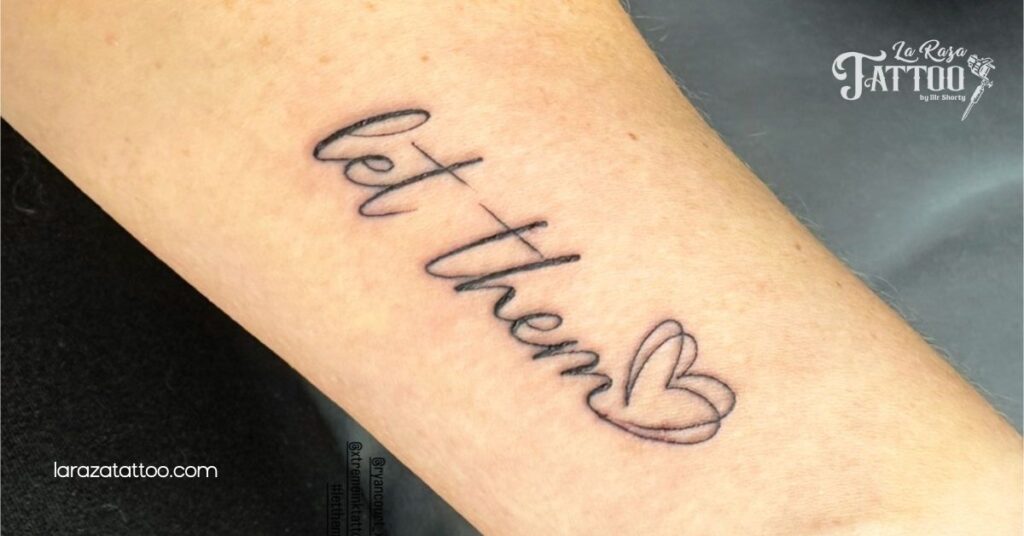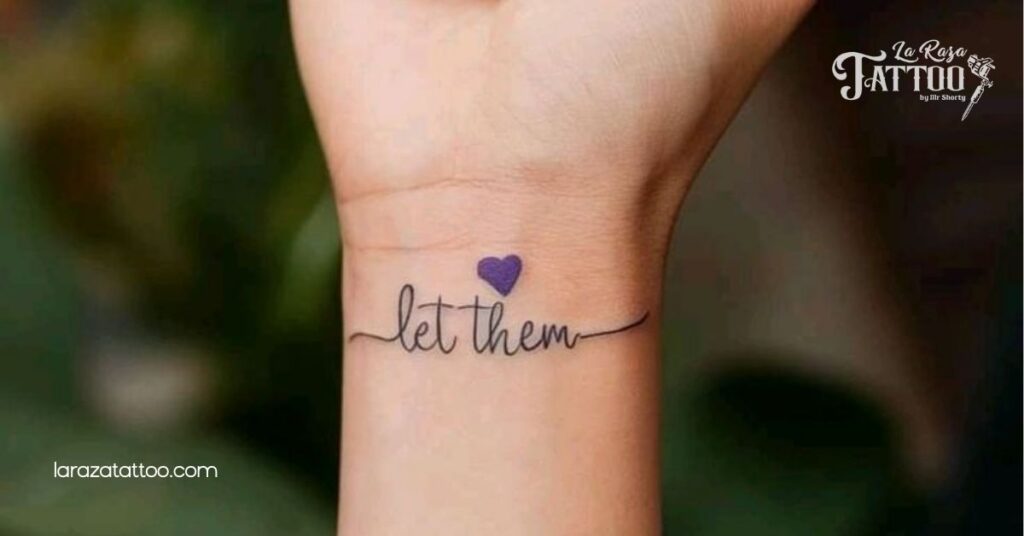Tattoos have evolved from mere body art to powerful expressions of identity and personal stories. If you’ve ever considered getting inked, you know it’s more than just a design; it’s a statement about who you are. Letting someone tattoo you can be a groundbreaking experience, one that connects you to your own narrative and the artist’s vision.
Imagine wearing a piece of art that resonates with your journey, a permanent reminder of your values and passions. By embracing this form of self-expression, you’re not just decorating your skin; you’re celebrating your individuality. So why hold back? Jump into the industry of tattoos and discover how they can empower you to share your story with the industry.
Let Them Tattoo: Embracing Body Art

Tattoos serve as more than just adornments; they’re powerful forms of self-expression. Consider your motivations behind getting inked. Whether it’s to commemorate a milestone or showcase your passions, each tattoo tells a story that is uniquely yours.
Explore the various styles available in the tattoo industry. From traditional designs to contemporary art, there are countless options for you to choose from. Finding a style that resonates with your personality can enhance your connection to the art.
Selecting the right artist is crucial. Research their portfolios to find an artist whose work aligns with your vision. Connecting with someone who understands your narrative makes all the difference in your tattoo experience.
Understand the process before committing. Know what to expect during your appointment, from the consultation to the final result. Gathering information helps reduce any anxiety and ensures you’re prepared for the journey.
Discuss your ideas openly with your tattoo artist. Sharing your inspirations can lead to a more personalized design that aligns with your story. Collaborating on the process ensures your tattoo embodies your essence.
Consider aftercare seriously. Proper care is essential to ensure your tattoo heals well and maintains its beauty. Following the artist’s instructions and keeping the tattoo clean will enhance its longevity.
Embrace the transformation of your body art over time. As you grow, your perspective on tattoos may evolve, and that’s perfectly normal. Allow your ink to reflect changes in your life, reminding you of growth and resilience.
Celebrate your individuality through tattoos. Each piece can symbolize who you are and the journey you’ve undertaken. By embracing body art, you’re making a statement about autonomy and self-love.
Understanding the Tattoo Culture

Tattoos carry deep cultural significance. They represent a rich history that spans thousands of years and showcases the diversity of human expression.
Historical Significance of Tattoos
Ötzi the Iceman, discovered near the Italian-Austrian border, provides the earliest known evidence of tattoos. This 5,300-year-old mummy had over 50 tattoos, thought to be used for therapeutic purposes like alleviating joint pain. Ancient Egypt had a similar connection to tattoos, primarily seen on female mummies. These tattoos not only served therapeutic purposes but also linked to high-ranking individuals such as priests and pharaohs.
In ancient Greece and Rome, tattoos held a different meaning. They were often used to mark slaves, criminals, and certain religious sects. The Ptolemaic period saw tattoos symbolize devotion to the gods, with Ptolemy IV displaying tattoos of ivy leaves to honor Dionysus.
Modern Tattoo Trends
Nowadays, tattoos cover a wide array of styles and meanings. You might notice trends shifting from traditional and tribal designs to more intricate watercolor and geometric patterns. Many people now view tattoos as personal narratives, showcasing their unique stories and experiences.
More individuals are opting for meaningful symbols over popular motifs. A growing number of artists now focus on custom designs customized to clients, improving the personal connection to the art. Communities centered around tattoo culture have also blossomed, offering spaces for sharing ideas and experiences.
As tattoo popularity continues to rise, it’s important to recognize evolving societal perceptions. Acceptance has grown, leading to a broader embrace of tattoos across various demographics. Whether you’re considering your first tattoo or expanding your collection, understanding these historical and modern contexts can help you make more informed choices.
The Reasons to Let Them Tattoo

Tattoos offer unique opportunities for personal expression and identity.
Personal Expression and Identity
You can communicate your feelings, thoughts, and ideas through tattoos. They serve as permanent artwork on your body, allowing you to express yourself authentically. Each design can carry deep meanings, reflecting your personal journey. Many individuals find that self-expression through tattoos helps boost their self-esteem. Telling stories about important life moments becomes possible with visual elements that commemorate loved ones, personal achievements, or milestones. You might create an identity that resonates with who you are and where you fit in the industry by choosing designs that reflect your experiences. Celebrating your uniqueness is what tattoos eventually symbolize, showcasing your distinct personality and life narrative.
Breaking Stereotypes and Stigmas
You can help challenge societal perceptions by embracing tattoos. People often view tattoos through a lens of stereotypes, associating them with certain behaviors or lifestyles. Breaking these stigmas creates space for conversations around the diversity of reasons people choose to get tattooed. With tattoos now seen as artistic expressions, more individuals recognize the value in body art. Many workplaces are beginning to accept visible tattoos, diminishing previous biases. By showing that tattoos can signify positive attributes, such as resilience and individuality, you contribute to a broader understanding of personal expression.
The Safety and Health Aspects of Tattooing

Understanding the safety and health aspects of tattooing is essential for a positive experience. You need to consider several factors, particularly when it comes to choosing the right professional and following aftercare instructions.
Choosing a Professional Tattoo Artist
Selecting a professional tattoo artist is crucial for your health and safety. Look for artists with proper certifications and good hygiene practices. They should maintain a clean work environment and use sterilized tools. Checking for good reviews can also help you find someone reputable. Having a consultation before getting tattooed allows you to ask questions and gauge their knowledge about skin care and ink safety. It’s smart to ensure they source high-quality inks, as some products may contain potentially harmful substances. Prioritizing a skilled artist can significantly reduce health risks associated with the tattooing process.
Aftercare Instructions for Tattoos
Following aftercare instructions for your new tattoo is vital for optimal healing. Avoid exposing your tattoo to direct sunlight for several weeks. Keeping it clean and applying an appropriate moisturizer weekly enhances healing. You should refrain from picking or scratching the tattoo, as this prevents infection and scarring. It’s also wise to monitor for any unusual signs like excessive redness or swelling. Always consult with your tattoo artist if anything seems off. Taking these simple yet effective steps can help ensure your tattoo not only looks great but also stays healthy over time.
Letting Them Tattoo: Legal and Age Considerations

Understanding the legal and age considerations around tattooing is essential before you let someone get inked. Each state has its own rules, which can influence your decision.
Age Restrictions for Tattooing
Most states set the minimum age at 18 for individuals to receive a tattoo without parental consent. You’ll find this policy in most regions, emphasizing that minors aren’t able to provide informed consent for medical procedures.
Several states allow minors to get tattoos if they have written consent from a parent or legal guardian. In New Jersey and Colorado, for instance, minors aged 16 can be tattooed with proper consent. Alabama also permits tattooing for minors, provided there’s written approval from a parent or guardian.
State Regulations on Tattoos
State regulations around tattooing vary significantly, and knowing these can help you navigate the tattoo industry more safely. Each state’s law dictates the age restrictions, consent requirements, and even the environments where tattooing can occur.
For example, California mandates that minors need both a parent’s written consent and the presence of a parent during the tattoo process. But, states like New York have no exact age for parental consent, which means professionals follow their studio policies.
It’s wise to check local laws before getting a tattoo to ensure a seamless process. By being informed, you can avoid surprises and ensure the tattoo process aligns with legal standards.
Conclusion
Embracing tattoos means embracing your story and individuality. As you discover the area of body art, remember that each tattoo is a personal expression of who you are. It’s not just about the ink; it’s about the journey that leads you to that moment of self-discovery.
By understanding the significance of your motivations and choosing the right artist, you can create a meaningful piece that resonates with your identity. Tattoos can serve as lasting reminders of your growth and resilience, challenging societal norms and celebrating your uniqueness.
As you navigate the tattoo process, prioritize safety and hygiene to ensure your experience is both enjoyable and healthy. So go ahead and let them tattoo; your body is a canvas for your most authentic self.
Frequently Asked Questions
What is the significance of tattoos in personal identity?
Tattoos are powerful expressions of individuality and personal narratives. They allow people to convey their values, passions, and milestones, serving as permanent reminders of their unique stories.
How should I choose a tattoo artist?
Selecting the right tattoo artist involves researching their portfolio, style, and reputation. Ensure their work resonates with your vision and schedule a consultation to discuss your ideas and comfort level.
What are some common motivations for getting a tattoo?
People get tattoos for various reasons, including commemorating significant life events, expressing personal beliefs, and showcasing passions. Understanding your motivation can enhance the meaning behind your body art.
What factors should I consider about tattoo aftercare?
Post-tattoo care is crucial for proper healing. Keep the tattoo clean, avoid direct sunlight, and follow your artist’s aftercare instructions to prevent infections and ensure the design remains vibrant.
Are there age restrictions on getting tattoos?
Yes, age restrictions for tattoos vary by state. In most cases, individuals must be at least 18 years old to get a tattoo without parental consent. Some states allow minors to get tattooed with a parent’s approval.
How have tattoos evolved in cultural significance?
Tattoos have a rich history, serving various purposes across cultures, from spiritual symbols to markers of bravery. Their acceptance in modern society reflects changing perceptions about self-expression and identity.
What are the health considerations for getting a tattoo?
To minimize health risks, choose a professional artist with certifications and good hygiene practices. Ensure they use high-quality inks and discuss your skin type and any allergies before proceeding with the tattoo.
How can tattoos challenge societal stereotypes?
Tattoos can defy stereotypes by showcasing diversity in self-expression. By embracing body art, individuals can foster conversations about acceptance and challenge norms surrounding personal appearance in various settings, including the workplace.






